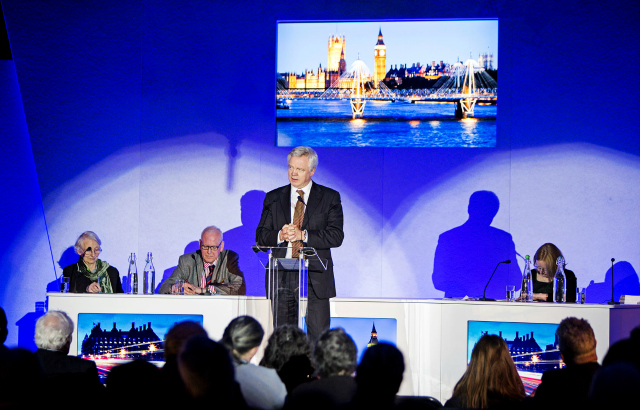Future of the UK hangs in the balance, according to experts at Mile End Institute launch event
The United Kingdom as we know it may not survive the next decade and is “no longer a fixed map in the collective UK mind”, according to Lord Professor Peter Hennessy, who was speaking at the launch of the Mile End Institute (MEI), at Queen Mary University of London on 2 March.

Lord Hennessy was joined by Conservative MP David Davis, crossbench peer Baroness Onora O’Neill, and broadcaster Carolyn Quinn (chair) to debate the question: can the UK survive without changing its Constitution?
To a sold-out crowd of 350 policymakers, journalists, academics and members of the public, Lord Hennessy said of the UK:
“I’m a natural optimist but I do carry one semi-nightmare scenario in my head. In 2017, or thereabouts, we squeak out of Europe. The Scottish question will then reopen, because Scotland will almost certainly vote to stay in. Scotland will very likely have an SNP majority government after the elections to Holyrood, and the Scottish government will say ‘we need another Edinburgh agreement, the deal is off’. So, in September 2022, Scotland leaves.
“In ten years’ time we could be out of the EU, shorn of Scotland, narrow, shrivelled, resentful, and inward-looking in the cold northern seas. Not a happy picture,” said Lord Hennessy.
Lord Hennessy argued that Constitutions must “feel fair” to all parts of the country, made more difficult by what he described as “the percussive effects of the Scottish referendum”.
English Votes for English Laws
David Davis agreed that on English Votes for English Laws (EVEL), “we have led ourselves into incredibly difficult circumstances”.
“What we should be arguing for on EVEL is something that’s clear cut, but yet again we’re looking at a fudge. What Hague has proposed as his favoured option, gives the amendment rights and some of the voting rights to English members of parliament if it’s an English issue, but then it comes back to the UK parliament again - and they’ve got to decide on the final outcome. The moment there’s a distinction between the UK group in parliament and the English group, you’re going to have another schism,” said Davis.
Baroness Onora O’Neill called for “a proper constitutional convention, with due seriousness, care and a lack of populism, to look at these issues”. On the widening gulf between UK nations, Baroness O’Neill said:
“What we need is something that is workable, fair, a coherent allocation of powers and duties, equality of citizenship – for example the right of appeal to the Supreme Court, a single passport, currency, borders, defence, and so on – and greater visibility of financial flows. I think subsidies from one part of the country to the other are absolutely fine, but they need to be for clear reasons, not by a formula that creates automatic privilege for some groups and some regions.”
Lord Hennessy said that the English question, and the proposals for English Votes for English Laws, “the kingdom to come, as one might call it”, remains “a first order question of strategic proportions for the UK”.
“The Union is no longer a fixed map in the collective UK mind; no longer an automatic pilot, guiding shared consciousness. I wish it were. I profoundly hope it can be, once more,” said Lord Hennessy.
The debate was the first in a series of events from the Mile End Institute, led by Professor Michael Kenny.
Videos from the event
About the QMUL Mile End Institute
- Policy, politics and public life in a changing Britain
The Mile End Institute (MEI) is a centre for policy, ideas and debate, based at Queen Mary University of London.
Its mission is to deepen and challenge public understanding of the crises facing our systems of politics and governance, and to promote a richer debate about public policy issues and the UK’s role within the wider world.
The Mile End Institute is jointly housed in:
Related items

28 July 2025

23 July 2025

17 July 2025
For media information, contact: